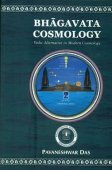Goloka, Go-loka: 14 definitions
Introduction:
Goloka means something in Hinduism, Sanskrit. If you want to know the exact meaning, history, etymology or English translation of this term then check out the descriptions on this page. Add your comment or reference to a book if you want to contribute to this summary article.
In Hinduism
Purana and Itihasa (epic history)
Source: archive.org: Puranic EncyclopediaGoloka (गोलोक).—A divine world. Mostly cows live in this world which is above all the other worlds. Surabhi, daughter of Dakṣa, acquired great powers by doing rigorous penance in this world. Pandits say that Goloka is the upper lip, Brahmaloka, the lower lip of Mahāviṣṇu. (Mahābhārata Śānti Parva, Chapter 347, Śloka 52).
Source: archive.org: Shiva Purana - English TranslationGoloka (गोलोक) is the name of a region (loka), according to the Śivapurāṇa 2.3.2.—Accordingly, as Sanatkumāra said to the three daughters of Svadhā (i.e., Menā, Dhanyā, Kalāvatī) after cursing them:—“[...] the youngest Kalāvatī shall be the wife of the Vaiśya—Vṛṣabhāna. At the end of Dvāpara, Rādhā shall be her daughter. [...] Kalāvatī by the virtue of Vṛṣabhāna shall become a living liberated soul and attain Goloka along with her daughter. [...]”.
Note: Goloka is a modern addition to the original series of fourteen lokas. It is identified with Gokula, a pastoral district on the Yamunā about Mathurā where Kṛṣṇa passed his boyhood with the cowherd.
Source: Cologne Digital Sanskrit Dictionaries: The Purana IndexGoloka (गोलोक).—The residence of Surabhi;1 bathers in Soma tīrtham and givers of presents of a cow with calf go to this region.2
- 1) Bhāgavata-purāṇa X. 27. 1; Brahmāṇḍa-purāṇa III. 32. 40; 41. 55; 42. 19; 43. 29; IV. 1. 156; Vāyu-purāṇa 100. 159; 104. 53-55.
- 2) Matsya-purāṇa 191. 99; 205. 8.

The Purana (पुराण, purāṇas) refers to Sanskrit literature preserving ancient India’s vast cultural history, including historical legends, religious ceremonies, various arts and sciences. The eighteen mahapuranas total over 400,000 shlokas (metrical couplets) and date to at least several centuries BCE.
Shaivism (Shaiva philosophy)
Source: Wisdom Library: ŚaivismGoloka (गोलोक) refers to the “world of cows”, which is explained in the twefth chapter of the Śivadharmottarapurāṇa
Source: academia.edu: Śivadharmottara Purāṇa: a SurveyGoloka (गोलोक).—At the climax of the description of śivapura we come to learn that the goloka is none other than śivapura itself! However, the impact of this proposition, a most astounding revelation on the face of it, dwindles away as we realize that here goloka does not designate the well-known Vaiṣṇava paradise of the cowherd Kṛṣṇa; in fact, the Śaiva paradise earns the name because the five celestial cow-mothers reside there together with the bull of dharma. Accordingly, there follows a eulogy of the cows and of the merits of protecting, giving, possessing and tending them.

Shaiva (शैव, śaiva) or Shaivism (śaivism) represents a tradition of Hinduism worshiping Shiva as the supreme being. Closely related to Shaktism, Shaiva literature includes a range of scriptures, including Tantras, while the root of this tradition may be traced back to the ancient Vedas.
Languages of India and abroad
Sanskrit dictionary
Source: DDSA: The practical Sanskrit-English dictionaryGoloka (गोलोक).—a part of heaven, cow-world.
Derivable forms: golokaḥ (गोलोकः).
Goloka is a Sanskrit compound consisting of the terms go and loka (लोक).
Source: Cologne Digital Sanskrit Dictionaries: Shabda-Sagara Sanskrit-English DictionaryGoloka (गोलोक).—n.
(-kaṃ) The heaven of Krishna. E. go a cow, and loka world.
Source: Cologne Digital Sanskrit Dictionaries: Benfey Sanskrit-English DictionaryGoloka (गोलोक).—m. Kṛṣṇa’s heaven.
Goloka is a Sanskrit compound consisting of the terms go and loka (लोक).
Source: Cologne Digital Sanskrit Dictionaries: Aufrecht Catalogus CatalogorumGoloka (गोलोक) as mentioned in Aufrecht’s Catalogus Catalogorum:—Parāmarśapūrvapakṣagranthavivecana. read Np. Iii, 14.
Source: Cologne Digital Sanskrit Dictionaries: Monier-Williams Sanskrit-English Dictionary1) Goloka (गोलोक):—[=go-loka] [from go] a m. (n., [Tantr.]), ‘cow-world’, a part of heaven, or (in later mythol, [Religious Thought and Life in India 118 and 291]) Kṛṣṇa’s heaven, [Mahābhārata xiii, 3195 (cf. 3347); Harivaṃśa 3994 (cf. 3899); Rāmāyaṇa ii; Brahma-purāṇa]
2) [=go-loka] b -loman, etc. See go, p.366.
Source: Cologne Digital Sanskrit Dictionaries: Yates Sanskrit-English DictionaryGoloka (गोलोक):—[go-loka] (kaṃ) 1. n. Krishnu's heaven.
[Sanskrit to German]
Sanskrit, also spelled संस्कृतम् (saṃskṛtam), is an ancient language of India commonly seen as the grandmother of the Indo-European language family (even English!). Closely allied with Prakrit and Pali, Sanskrit is more exhaustive in both grammar and terms and has the most extensive collection of literature in the world, greatly surpassing its sister-languages Greek and Latin.
Kannada-English dictionary
Source: Alar: Kannada-English corpusGōlōka (ಗೋಲೋಕ):—[noun] (myth.) one of the several higher regions, a part of heaven.
Kannada is a Dravidian language (as opposed to the Indo-European language family) mainly spoken in the southwestern region of India.
See also (Relevant definitions)
Starts with: Goloka nyayaratna, Golokanatha, Golokatapinyupanishad, Golokavarnana, Golokavasin, Golokeshvara.
Full-text (+33): Vindu, Golokavarnana, Kutaghatitalakshanavivecana, Golaka, Tritiyapragalbhalakshanavivecana, Pakshatapurvapakshagranthavivecana, Pakshatasiddhantagranthavivecana, Puchalakshanavivecana, Pratijnalakshanavivecana, Tritiyamishralakshanavivecana, Badhasiddhantagranthavivecana, Dvitiyamishralakshanavivecana, Asiddhapurvapakshagranthavivecana, Asiddhasiddhantagranthavivecana, Pancalakshanivivecana, Prathamacakravartilakshanavivecana, Prathamamishralakshanavivecana, Badhapurvapakshagranthavivecana, Samanyalakshanavivecana, Anumitivivecana.
Relevant text
Search found 33 books and stories containing Goloka, Go-loka, Gōlōka; (plurals include: Golokas, lokas, Gōlōkas). You can also click to the full overview containing English textual excerpts. Below are direct links for the most relevant articles:
Garga Samhita (English) (by Danavir Goswami)
Verse 5.5.5 < [Chapter 5 - Śrī Kṛṣṇa’s Entrance Into Mathurā]
Verse 3.8.14 < [Chapter 8 - The Opulences of Śrī Girirāja]
Verse 2.3.36 < [Chapter 3 - Description of the Yamunā’s Arrival]
Annadatri-carita (study) (by Sarannya V.)
2. Importance of Annadana in Sanskrit literature < [Chapter 1 - The Myth of Grand Feast]
Srila Gurudeva (The Supreme Treasure) (by Swami Bhaktivedanta Madhava Maharaja)
Difference between Aiśvarya and Mādhurya < [Chapter 2.12 - Early ISKCON Conversations with Śrīla Gurudeva]
Why do you address Śrī Kṛṣṇa Caitanya Mahāprabhu as God? < [Chapter 1.5 - Back to Home Village]
A Locked Treasure Chest < [Chapter 2.8 - Our Lasting Relationship]
Brihad Bhagavatamrita (commentary) (by Śrī Śrīmad Bhaktivedānta Nārāyana Gosvāmī Mahārāja)
Verse 2.1.6 < [Chapter 1 - Vairāgya (renunciation)]
Verse 2.1.24 < [Chapter 1 - Vairāgya (renunciation)]
Verse 2.2.239 < [Chapter 2 - Jñāna (knowledge)]
Related products

